Submitted by Charles Harrelson–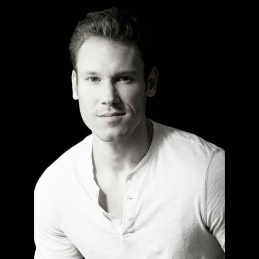 a working actor and an ensemble member on The Box House Team, “The Light Bulb Society”
a working actor and an ensemble member on The Box House Team, “The Light Bulb Society”
“Improvisation is essential if the actor is to develop the spontaneity necessary to create in each performance ‘the illusion of the first time.’” -Lee Strasberg
This is the crux of acting. Spontaneity.
I’ve been an actor for almost nine years, and believe me, I’ve given my fair share of listless performances. Most of the time it wasn’t on purpose, either! When it did happen, it was usually because I was in my head to the point where I would convince myself there was no other way to approach the scene or say a line that I’ve been performing for weeks on stage. It’s an even worse feeling in film and television, because the director may ask you right then and there to give them something different than what you’ve been doing, and ff you don’t have an answer, you run the risk of looking unprofessional and boring.
Luckily, actors have this cool device in their toolshed called improvisation. It can usually be found just passed the tangled garden hose, behind the empty flower pots, on a shelf of old paint cans and extra motor oil.
Careful, though… most likely, there’s a stray cat lording over it!
Here, kitty-kitty-kitty…
Although you may not be able to improvise on set (some directors will let you), you can still use improv to discover the natural or sensible behavior of your character when you prep, therefore, giving you a mixed set of logical responses when the director does insist on a different read. It acts as a safety net for those situations.
There’s no two ways about it. Acting is hard, hard work. Remembering lines, hitting your mark or finding your light, pretending there’s no audience or ignoring a camera that’s two inches from your face is tough when you’re trying to be “private in public.” The amount of homework you have is no walk in the park, either. Breaking scripts down into objectives (overall and scene), unraveling your character’s obstacles, finding beats and actions, fulfilling historical, thematical, and subtextual obligations is all a part of the job, and by the time you get on stage or on set, you got all this stuff in your brain, which you’re supposed to just “let go” when you perform. Mr. Strasberg calls this “conscious preparation – unconscious result.”
This is where improv can save you. It gets you out of your head, plain and simple. Thinking becomes secondary, and we trust our creative impulses will meld with the work we’ve done beforehand.
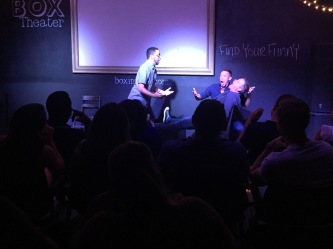
The great thing about this particular tool – improv – is that it’s so closely related to acting that they’re almost one in the same. Technical differences aside, the core of acting and improv is listening and reacting. A parity of giving and taking. If you “let go,” and drop any preconceived ideas of how the scene should play out, and make it about your scene partner (relationship), then the outcome, whether it works in the context of the play or film, or not, will be truthful, and the truth is always more interesting.

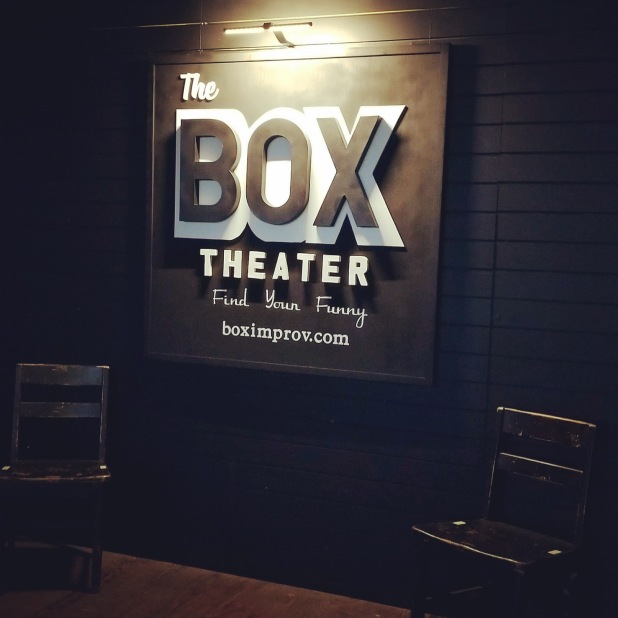
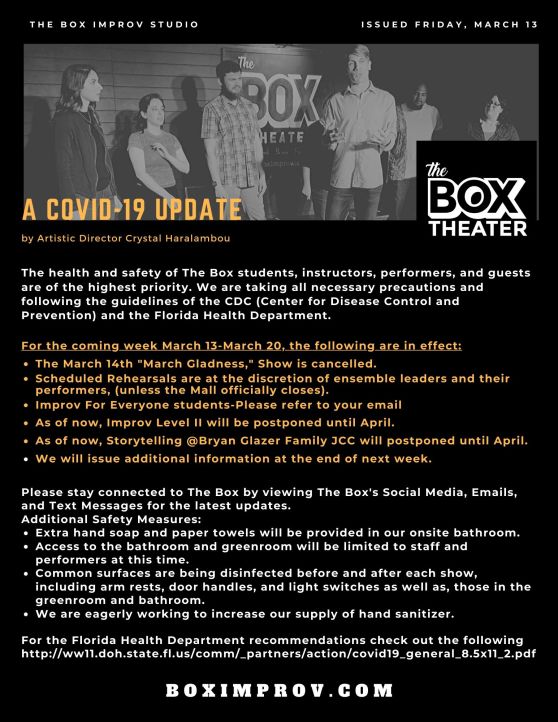

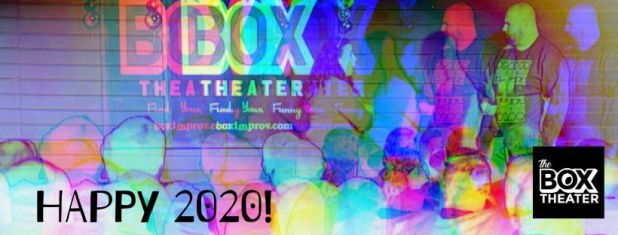
 It’s a new year and a great excuse to tap into your creativity. Feed your artistic soul with an Improv Class at The Box Theater. After our first session ends, we kick off another new 6-week, Improv For Everyone class in March 2020, and you won’t want to miss it.
It’s a new year and a great excuse to tap into your creativity. Feed your artistic soul with an Improv Class at The Box Theater. After our first session ends, we kick off another new 6-week, Improv For Everyone class in March 2020, and you won’t want to miss it.  Dear Aunt Gertrude is back with the “Last Fri,” pop up show on Friday, Jan 31 at 7:30pm. They bring in guest improv teams from Tampa Bay and beyond and a guest monologist too. Come enjoy some laughs.
Dear Aunt Gertrude is back with the “Last Fri,” pop up show on Friday, Jan 31 at 7:30pm. They bring in guest improv teams from Tampa Bay and beyond and a guest monologist too. Come enjoy some laughs.





 Good laughter is terribly infectious, yet you don’t see a lot of it in movies, and I’m guessing that it falls into the same category as complex special effects and scenes with animals, in that, time and money often force a director to think whether they really have the time in the schedule to get the scene.
Good laughter is terribly infectious, yet you don’t see a lot of it in movies, and I’m guessing that it falls into the same category as complex special effects and scenes with animals, in that, time and money often force a director to think whether they really have the time in the schedule to get the scene.  Submitted by Victoria Dym, actress, storyteller, published poet, Certified Laughter Yoga Leader, ordained minister, and an ensemble member on the The Box house team, Dear Aunt Gertrude. Twitter Handle
Submitted by Victoria Dym, actress, storyteller, published poet, Certified Laughter Yoga Leader, ordained minister, and an ensemble member on the The Box house team, Dear Aunt Gertrude. Twitter Handle 
